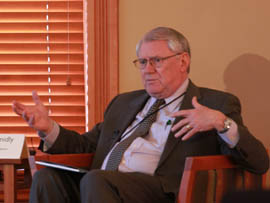Cronkite News has moved to a new home at cronkitenews.azpbs.org. Use this site to search archives from 2011 to May 2015. You can search the new site for current stories.
Education leaders: Sustainability mission transcends science
TEMPE – Universities and colleges are in an ideal position to promote sustainability to address climate change in ways that reach beyond science, Arizona State University’s president said Friday.
“The institutions themselves have to teach,” said Michael Crow, who led a panel of higher education leaders at ASU’s Tempe campus. “If the teachers can’t figure that out, who can?”
The panel was part of the 2012 Southwest Regional Collaborative Symposium, sponsored by the American Colleges and University Presidents’ Climate Commitment. Signatories to that commitment include the presidents of Arizona’s three public universities.
The event brought together representatives from higher-learning institutions across the Southwest to share resources, contacts and ideas to support sustainability efforts on their campuses.
Members of Friday’s panel, moderated by Crow, included John Haeger, president of Northern Arizona University, and Jan Gehler, president of Scottsdale Community College.
David Schmidly, president of the University of New Mexico, said colleges and universities should foster sustainability initiatives that can be translated to society.
“When sustainability as a core principle begins to emerge, the key champions begin to emerge,” he said.
Panelists discussed how their campuses have retrofitted buildings for energy efficiency, increased their commitment to public transportation, made campuses more walkable and promoted sustainability in their cultures and classrooms.
“We have to maintain quality … we have to rethink the enterprise,” Haeger said.
Gehler said that while her campus employs sustainability professionals it is committed to promoting discussion and lifestyle changes among students and faculty as well.
“Our goal is to convince everyone in our institution that it isn’t just a job,” she said. “It’s about the universe and our role in the universe.”
Crow said ASU has developed multiple programs within traditional disciplines like economics to help create this awareness.
“We’ve set an institutional objective,” he said.
Schmidly said promoting sustainability on campus makes economic sense by helping institutions save energy costs.
“Sustainability is good business … and its helped us balance our budget,” he said.
Haeger said that faculty projects are making strides toward a goal of carbon neutrality at NAU but added that it’s conversations driven by students that generate real change.
“The challenge is to be sure you inform the stakeholders on our campuses,” he said. “My job is to get out of the way.”
Ultimately, colleges and universities must be willing to step into uncharted territory with innovative and unique solutions to many of the problems facing the environment, society and the economy, Gehler said.
“If we’re ever really going to prepare people to change the world … we really must take risks,” she said.








